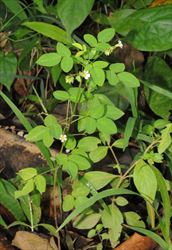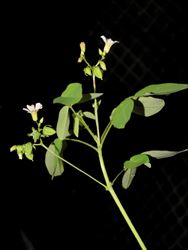- Widespread. In Australia, American Samoa, FSM, Fiji, French Polynesia, Palau, Samoa.
- Occasional, perennial weed, in disturbed habitats – forest clearings, along roadsides. Favours well-drained, light sandy and medium loam soils. Weed of coconut, taro and sugarcane plantations, pastures. Tolerates light shade.
- Stems up to 1.5m, densely hairy at base, often woody. Leaves, alternate, each with long stalks (up to 10cm), three, oval to spear-shaped leaflets (central leaflet largest), and hairy beneath. Flower stems from leaf axils, often branching into two, bearing several tubular flowers on short stalks, with white, pink or purplish petals and bright greenish-yellow centres. Fruits egg-shaped (10mm long).
- Spread: seed in water and by ants. Plant trade: used as an ornamental and in traditional medicines.
- Biosecurity: risk is unofficial introduction of seed and plants. Check imported machinery/vehicles.
- Biocontrol: none.
- Cultural control: hand-weed; slashing; mulch (5-10cm) to prevent seedling growth; clean soil and seeds from machinery/vehicles.
- Chemical control: In Fiji, glyphosate, 2,4-D, dicamba, MCPA








